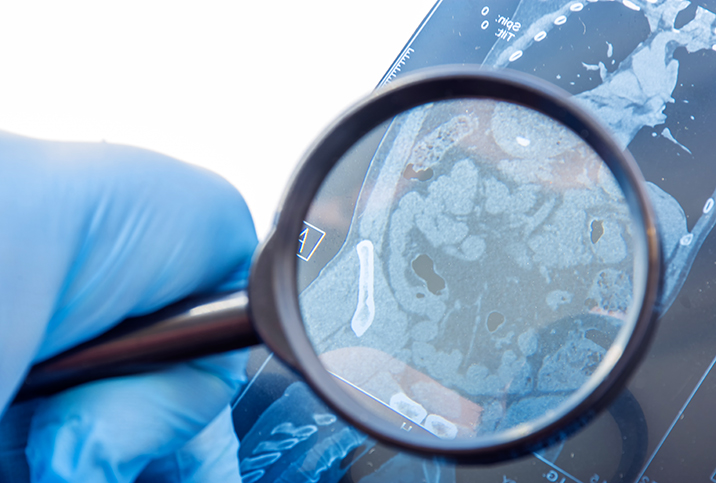Research indicates there are as many as 500,000 Americans living with Crohn's disease, a form of inflammatory bowel disease (IBD). This number has increased during recent years.
The Facts About Crohn's Disease
Find out how Crohn's disease can affect your sexual health.

What is Crohn's disease?
Crohn's disease causes chronic inflammation and can affect any part of the gastrointestinal (GI) tract, but most commonly causes problems in the small and large bowels. The disease can progress to involve the full thickness of the bowel layers, which is termed "transmural" involvement.
Although Crohn's disease primarily affects the GI tract, it can affect or manifest in nearly every bodily system. Skin, eyes, joints, the liver and bile ducts can all become inflamed in severe cases of Crohn's disease.
Types
IBD is an umbrella term used to refer to two primary types of diseases that cause inflammation of the bowels: Crohn's disease and ulcerative colitis.
Ulcerative colitis is a condition that can manifest as continuous ulcers on involved portions, such as the lining of the rectum and large intestine. Crohn's disease affects similar locations but doesn't tend to cause ulcers. Rather, sufferers can experience skip lesions and inflammation in the lining of the digestive tract. Crohn's disease can affect any part of the gastrointestinal tract from the anus all the way up to the mouth, according to the Crohn's & Colitis Foundation. But Crohn's disease most often affects the end of the small bowel, known as the ileum, and the beginning portion of the colon, known as the ileocolic.
Symptoms
Individuals with Crohn's disease often experience flare-ups, or periods of time when symptoms are active, which are followed by remission periods when symptoms are minimal or dormant.
Some of the most common symptoms of Crohn's disease include:
- Bloody stool
- Cramping
- Fatigue
- Fever
- Pain in the abdomen
- Reduced appetite
- Sores in the mouth
- Unintentional weight loss
Fistulas can also form as a result of chronic Crohn's disease, causing pain or drainage in parts of the bowel as a result of inflammation from a tunnel into the skin.
The skin, eyes, joints, liver and bile ducts can become inflamed during severe flare-ups of Crohn's disease, which can lead to further complications, including kidney stones, iron deficiency and stunted growth in children.
Causes
The exact cause of Crohn's disease is unclear, according to experts. While it was once believed by some doctors and researchers that diet and stress were the main sources of IBD, this is no longer the case. However, these factors are still thought to influence the management, prevention and severity of symptoms.
Now some researchers have theorized that malfunctions of the immune system may be the cause of IBD. Still, studies remain ongoing in an effort to conclusively determine the cause of Crohn's disease and other forms of IBD.
Risks
There is no surefire way to prevent Crohn's disease. However, it's possible to assess if you are at greater risk of developing the condition, so you can talk to your doctor about how to manage the risk. It's also worth mentioning that Crohn's disease puts an individual at greater risk for colon cancer, so being vigilant about cancer screenings is vital.
Risk factors for Crohn's disease include:
- Family history. If you have a close relative (parent, child or sibling) who has Crohn's disease, you're more likely to develop the condition yourself.
- Age. Though Crohn's disease can develop at any age, most people are diagnosed earlier in life, before age 30.
- Medications. Familiar nonsteroidal anti-inflammatory drugs (NSAIDs)—ibuprofen, naproxen sodium (Aleve) and diclofenac sodium, to name a few—can worsen Crohn's disease.
- Smoking status. Cigarette smokers are at a greater risk for developing Crohn's disease. Smokers are also more likely to experience more severe cases of Crohn's disease that may require surgery. Quitting cigarette smoking may substantially lower these risks.
Ethnicity. Crohn's disease affects people of every ethnic group. However, white people, particularly those of Ashkenazi Jewish descent, are at the highest risk for developing the disease.
Diagnosis
If you think you may be experiencing symptoms of Crohn's disease, it's important to consult your doctor immediately. Crohn's disease is typically diagnosed only after other possible causes for your symptoms are ruled out.
Since Crohn's disease can't be diagnosed based on the results of a single test, experts typically use a combination of lab work and procedures to determine whether you have the disease. These diagnostic measures can include blood tests, stool studies and procedures, such as a colonoscopy, CT (computed tomography) scan and MRI (magnetic resonance imaging) scan.
Gut health and sexual health
Whether you're dealing with occasional constipation or diarrhea or something more chronic, such as Crohn's disease or ulcerative colitis, it's clear that gut health can impact your sexual health.
Talking about digestive issues has long been seen as taboo, and for some people, the topic can feel like an antithesis to striking the right mood in the bedroom. However, if symptoms of IBD or other gut conditions make sex uncomfortable or painful, it's important to talk to your partner—and your doctor—about it.
Talking to your doctor is especially helpful, as together you can find ways to manage your symptoms so you can reclaim your sensuality in the bedroom. Being open and honest with your partner can prevent miscommunication about your apprehensiveness in the sheets and create space for emotional intimacy that could enhance your relationship overall.
Managing sexual health with Crohn's disease
Severe flare-ups of Crohn's disease can lead to a host of symptoms, but one particularly severe complication is the formation of fistulas. Significant inflammation caused by Crohn's disease sometimes results in the lining of the intestine breaking through between loops of the bowel or toward the skin, and this can often manifest in the vicinity of the anus. These fistulas can then form abscesses in the anal and genital regions, making any attempt at sexual pleasure in those areas potentially embarrassing, unsafe and painful.
Crohn's disease can be debilitating. Keeping in regular consultation with your doctor about potential treatments, as well as early and consistent monitoring of the disease, could help improve your prognosis for the long term and prevent serious complications.
Dating with Crohn's disease
Gastrointestinal issues are never fun. This sentiment can ring even more true when trying to navigate them while dating. At the end of the day, Crohn's disease is a medical condition and it's up to you to decide if, and with whom, you share said information. If you feel comfortable and safe enough with your dating partner to open up about your condition and the symptoms it causes, you may be able to create an opportunity for greater understanding, vulnerability, compassion and support in a relationship.
Talking to your partner about Crohn's disease
When you're able to be open about your condition and symptoms with an established partner, you may find you feel more empowered to be forthcoming about times when flare-ups are preventing you from fully enjoying intimacy in ways you normally would. These situations can create opportunities for you and your partner to get creative with ways to be intimate. If you talk to your partner about what you're going through with Crohn's disease, they can become a more fully equipped member of your emotional support system.
Diet
Crohn's disease can seriously impact your body's ability to absorb nutrients and properly digest the food you eat. With this in mind, it's important to consciously ensure you're getting enough food and nutrients to maintain overall health. Your doctor may recommend a specific nutrition plan to ensure that you remain adequately nourished.
Some foods, such as insoluble fibers, dairy and alcohol, have been known to trigger flare-ups and, therefore, are better to avoid altogether.
Treatments
There is presently no cure for Crohn's disease, though there are a variety of treatment options available to mitigate symptoms, reduce inflammation, and prevent and address complications.
Treatments for Crohn's disease include anti-inflammatory medication, immune system suppressors, antibiotics and biologics, which are medications that treat digestive tract inflammation by targeting certain proteins produced by the immune system. Your doctor may provide other medications for symptoms such as pain, diarrhea and vitamin deficiency. Nutrition therapy and surgery may become necessary if other treatments are not effective.
Natural remedies
Alternative treatments can alleviate certain symptoms of Crohn's disease. Yoga and mindfulness practices can be used to lower stress and anxiety levels, which may contribute to inflammation in the body. Herbal remedies, such as drinking chamomile tea, can help soothe an upset stomach and may help address mild symptoms of stomach upset.
One of the most useful nonmedical treatments for Crohn's disease is eliminating food and drinks that can trigger symptoms and instead focusing on eating nutrient-dense foods.
Living with Crohn's disease
Crohn's disease is a chronic illness that can take its toll not only on your body but also on your mental health. At times, living with Crohn's disease may feel like a roller coaster of flare-ups and periods of remission. It's important to remain in regular consultation with your doctor to get the treatment you need for symptoms and prevent serious complications.
Regardless of the severity of your symptoms, the constant discomfort and anxiety about the next unexpected and urgent need to go to the bathroom may leave you feeling anxious and even depressed. For these reasons, it can be helpful to lean on your emotional support group, whether they be loved ones in your personal life or individuals from a support group of others who live with Crohn's disease or similar IBD conditions.
Talking to a therapist can additionally equip you to navigate the challenges that come from living with a chronic illness. Living with Crohn's disease may not always be easy, but you don't have to do it alone.
FAQs
What are some early warning signs of Crohn's disease?
Common early warning signs of Crohn's disease include fever, fatigue, pain in the abdomen, cramping, bloody stool, sores in the mouth, reduced appetite and unintentional weight loss. Symptoms usually develop gradually and vary in severity, but may present abruptly. Crohn's disease often includes a cycle of flare-ups followed by periods of remission where symptoms substantially lessen or go dormant altogether.
Is Crohn's disease curable?
There is presently no cure for Crohn's disease, though there are a variety of treatment options available to improve symptoms, reduce inflammation, and avoid and address complications. Treatments for Crohn's disease include anti-inflammatory medication, immune system suppressors, antibiotics, biologics, nutrition therapy and surgery, when necessary.
What is the main cause of Crohn's disease?
The exact cause of Crohn's disease is unclear. While it was once believed by some doctors and researchers that diet and stress were the primary sources of inflammatory bowel disease, that is no longer the case, though these factors are still thought to influence the severity of symptoms. Research is ongoing, and some experts theorize that malfunctions of the immune system may be the cause of Crohn's disease and other IBD conditions.












